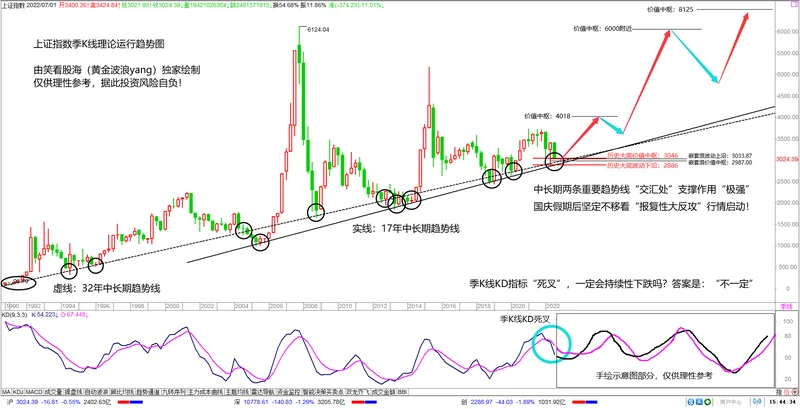China's SSE Index Upgrade: Why This Signals a New Era for Global Tech & Finance
I spend most of my days thinking about the future. I look at breakthroughs in quantum computing, AI, and biotechnology, and I see the tectonic plates of our world shifting. But sometimes, the most profound revolutions don’t arrive with a flashy demo or a charismatic CEO on a stage. They arrive quietly, in the dense, jargon-filled text of a regulatory filing.
That’s exactly what just happened. The Shanghai Stock Exchange announced a revision to its core SSE 180 Index, and when I first saw the news, I almost scrolled past it. An index update? It sounds like the kind of financial housekeeping that only accountants could love. But as I read the details, I felt that familiar spark—the one that tells you you’re not just looking at a minor adjustment, but at the first sketch of a radically different future. This isn’t just about numbers. It’s about a fundamental redefinition of what a “valuable” company is in the 21st century.
We're witnessing a major economic power attempting to hard-code a conscience into its market. And that, my friends, is a story worth telling.
The Blueprint for a Smarter Market
For years, most major stock indices have operated like a simple, brute-force algorithm: find the biggest companies by market value, maybe screen them for liquidity so they’re easy to trade, and you’re done. The SSE 180, home to China’s blue-chip giants like Kweichow Moutai and Ping An, was no different. It was a list of the heavyweights, dominated by finance and other established sectors.
The new rules, set to take effect on December 16, 2024, are a complete paradigm shift. Think of the old index as an all-star team picked purely on celebrity status. You might get a lot of famous players, but the team itself could be wildly unbalanced and dysfunctional. The new SSE 180 is being designed like a championship-winning franchise. It’s not just about picking the biggest players anymore; it’s about building a coherent, resilient, and forward-looking team.
They’re introducing weight limits to prevent a few mega-companies from dominating the entire index, ensuring diversity. They’re adding industry balance rules to make sure the index actually reflects the broad, dynamic structure of the modern economy, not just the legacy giants. They’re even overhauling the selection method itself to better blend a company’s size with its actual trading liquidity—in simpler terms, it’s not just about how big you are, but how much the market truly believes in you on a day-to-day basis.

This is the architectural phase. It’s the behind-the-scenes work of laying down a smarter, more robust foundation. But it’s the final piece of the blueprint that truly took my breath away.
The Conscience Clause
Buried in the announcement was a rule that I honestly had to read three times to fully grasp its significance. The index will now incorporate an ESG—Environmental, Social, and Governance—filter. Any company with a low ESG rating (specifically, a C or below) will be excluded. Period.
Let that sink in. This isn’t a separate, niche “green” fund. This is the main event, the core blue-chip index of the world’s second-largest economy. Shanghai is effectively posting a sign on the front door of its most exclusive club that reads: “If you pollute indiscriminately, treat your workers poorly, or have abysmal governance, you are not welcome here.” This is the kind of move that sends a shockwave through every boardroom in the country—it’s a direct signal that the very definition of a successful, top-tier company is being rewritten to include corporate responsibility as a non-negotiable prerequisite.
This is so much more than a box-ticking exercise. It's a powerful incentive structure. What does this tell the next generation of ambitious Chinese entrepreneurs? It tells them that to reach the pinnacle of the market, they can’t just chase profit at all costs. They must build sustainable, ethical, and well-governed businesses from day one. How will this pressure the existing giants to clean up their act? The threat of being dropped from the premiere index—and the massive institutional funds like the Huaan SSE 180 ETF that track it—is a far more potent motivator than a thousand government reports. 华安上证180ETF投资价值分析:指数编制优化及增量资金流入 提升上证180指数投资价值 - Futubull - 富途牛牛
This reminds me, in a way, of the early days of the internet. Back then, we were just building the protocols—the TCP/IP, the HTTP—that would govern the flow of information. They seemed like technical minutiae at the time, but they contained the seeds of the open, interconnected world we live in today. This index revision feels similar. It’s a change to the source code of capitalism itself.
Of course, this move isn’t without its own set of critical questions. Who, exactly, is assigning these ESG ratings, and what is their methodology? We have to ensure that such a powerful tool is wielded with transparency and isn’t just used to reward political allies. The responsibility to get this right is immense. But the ambition? The vision? It’s undeniable.
The Ripple, Not the Splash
So, what’s the real story here? This isn’t about a few stocks moving up or down on December 16th. That’s the splash. The real story is the ripple. It’s the slow, powerful, and irreversible current this decision sends out across the entire global economy. By embedding values directly into its core financial architecture, China is making a bold statement about the future. It’s saying that long-term value creation is impossible without considering a company’s impact on the world. It’s a quiet revolution, but it’s a revolution nonetheless—a blueprint for a more responsible and, ultimately, a more durable form of capitalism. And I, for one, cannot wait to see who follows their lead.
Related Articles
Julie Andrews: Why Her Legacy Endures Beyond Her Iconic Voice
I spend my days analyzing systems. I look at code, at networks, at AI, searching for the elegant des...
The Data on Tiempo: Analyzing the Valuation vs. the Narrative
Elysian's 'Project Chimera': The Multi-Billion Dollar Bet on a Tech Fantasy The polished sizzle reel...
The 'Mad Money' Phenomenon: What Our Search for Cramer & Keaton Reveals About Us
Jim Cramer Just Dismissed the Future of Work and Flight. Here's Why He's Missing the Bigger Picture....
John Malkovich Cast as President Snow: An Analysis of the Casting and Its Implications
The announcement landed with the precision of a well-funded marketing campaign. The Hunger Games, a...
DWP Christmas Bonus 2025: Eligibility and Payment Shifts
The DWP's Christmas Bonus: A Tiny Spark of Hope in a Winter of Need Okay, folks, let's talk about so...
Funko's Future: Sales Dip vs. Pop Culture Domination – What Reddit is Saying
Funko's Not Dying, It's Evolving: Why the Pop Culture King is Poised for a Comeback Okay, let's be r...





